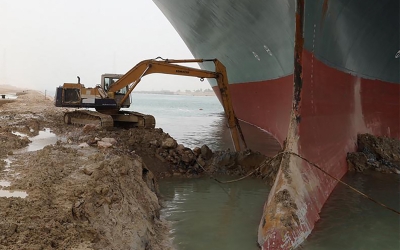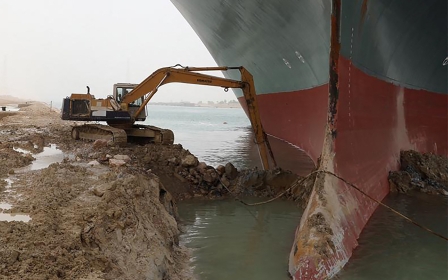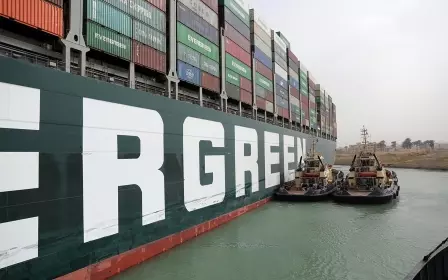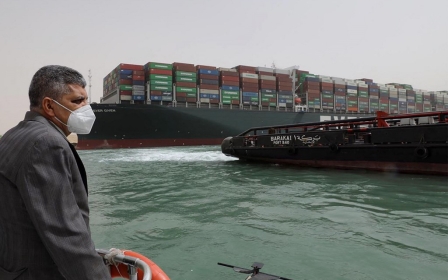Suez Canal: What is the global impact of the blockage so far?
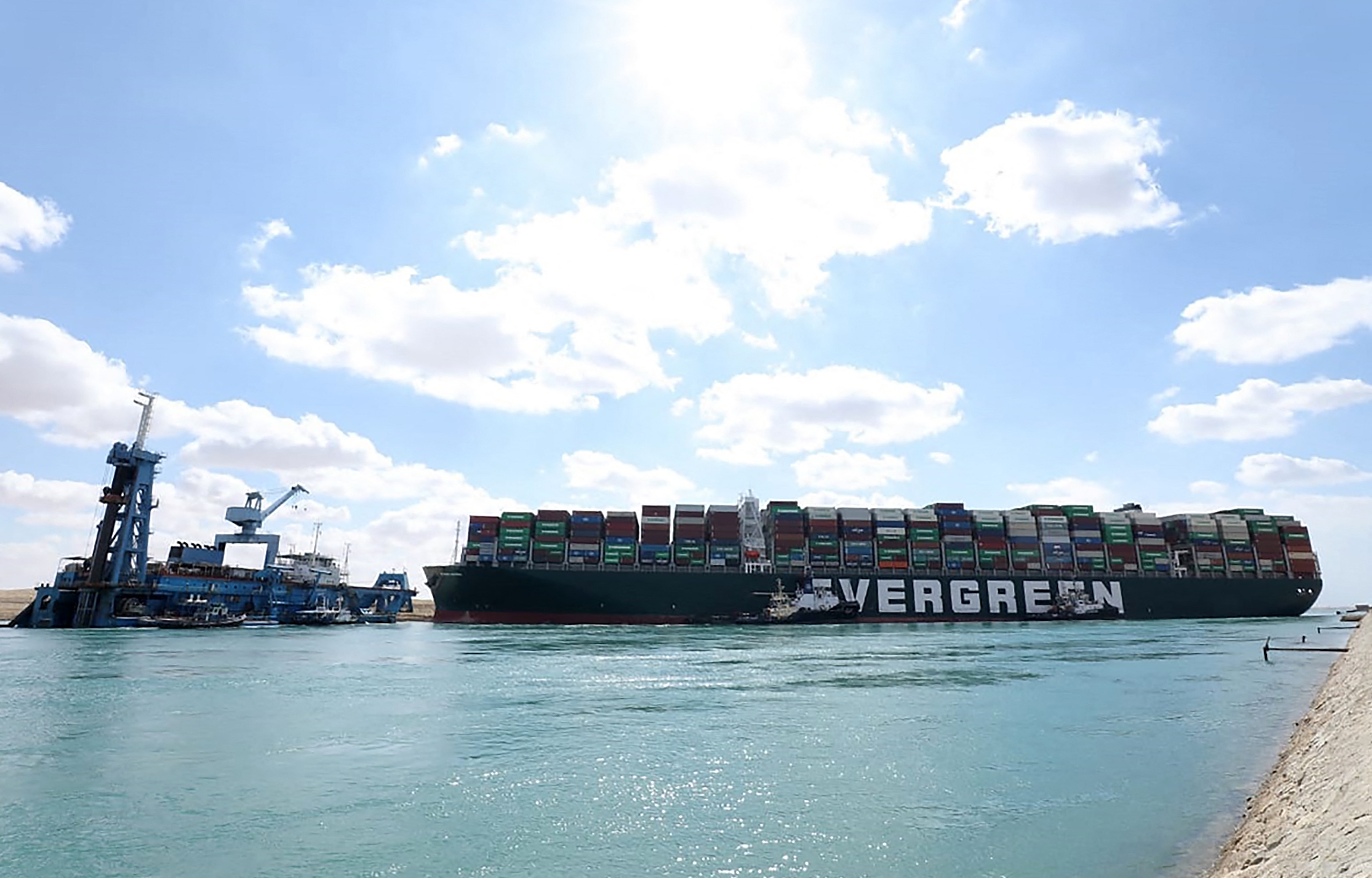
While the Suez Canal blockage is continuing to provide fresh material for funny memes on socal media, the real world impact of the interruption to one of the world's most important shipping routes is still only beginning to unfold.
Around $9.5bn worth of trade is being held up each day as a result of the grounding of the Ever Given, and economists are becoming increasingly concerned about the impact on inflation and a hiking of the cost of consumer goods if the situation drags on.
There have also been rumblings in some circles that the blockage could spur on the development of other shipping routes, less likely to suffer similar problems in future.
So far, a number of shipping companies have already begun to divert round the horn of Africa and the Egyptian government is likely to become increasingly nervous about the loss of traffic impacting on its economy, which depends on the canal.
"The idea of frictionless trade is central to the operation of global capital, and moments like this show some of the seams, some of the creaky bits," Laleh Khalili, professor of International Politics at Queen Mary University and author of Sinews of War and Trade: Shipping and Capitalism in the Arabian Peninsula, told Middle East Eye.
New MEE newsletter: Jerusalem Dispatch
Sign up to get the latest insights and analysis on Israel-Palestine, alongside Turkey Unpacked and other MEE newsletters
"Also ironically, it seems that the very size of the ship - which is central to economies of scale in shipping and thus more profitability - may have caused the incident in the first place."
Inflation risks
One of the biggest issues being assessed by analysts is the risk that the blockage could lead to rising inflation.
Although there has been little direct impact on the energy market so far, partly as a result of the time of year, Rystad Energy told Reuters that if the blockage were to last for two weeks, around one million tonnes of liquid natural gas could be delayed for delivery to Europe.
A study by German insurer Allianz Global published on Friday suggested the blockage could cost global trade $6bn-$10bn a week.
The study also found that each week the massive cargo ship is stuck will knock around 0.2 to 0.4 percentage points off annual global trade growth, which has already been suffering as a result of the Covid-19 pandemic.
"The problem is that the Suez Canal blockage is the straw that breaks global trade's back," the study's authors wrote.
"Suppliers' delivery times have lengthened since the start of the year and are now longer in Europe than during the peak of the Covid-19 pandemic."
Ship diversions
Until the middle of the 19th century, the Cape of Good Hope at the tip of South Africa was one of the key global shipping routes, before the construction of the Suez Canal made it largely redundant.
Now, however, many ships are once again taking the long and potentially dangerous journey around the bottom of the African continent.
'Whether maritime lines will have to use alternative maritime routes depends on the cost of fuel. These alternative routes will be very costly for shipping companies and maritime lines. The price of fuel controls the whole thing to a great deal'
- George Safwat, Suez Canal Authority
According to tanker tracking data compiled by Bloomberg, the oil tanker Marlin Santorini, a one million barrel capacity Suezmax sailing under the Singapore flag, switched destinations away from the Suez Canal, and appeared to be turning south towards the cape.
The news site cited shipbrokers saying it appeared to be the first oil tanker to have switched course. Numerous other ships have already done so, despite an estimated 30 percent increase in journey time.
But the alternative route creates a whole new set of risks, not least the threat of piracy.
A number of shipping companies have already called on the US navy to provide escorts for ships travelling the waters, where there has been an increase in pirate kidnappings in recent months.
Dimitris Maniatis, chief commercial officer of Seagull Maritime Security, a provider of ship guards, told the Financial Times that private security could potentially cost between $5,000 and $10,000 per vessel if the ships waiting at the southern entrance of the canal needed to turn back.
George Safwat, official spokesman of the Suez Canal Authority, told MEE there was international insurance for the vessels transiting the canal, including those stranded because of the blockage.
"Whether maritime lines will have to use alternative maritime routes depends on the cost of fuel. These alternative routes will be very costly for shipping companies and maritime lines. The price of fuel controls the whole thing to a great deal," he said.
"We have enlisted help from Dutch and Norwegian companies to help us free the Panama-flagged Ever Given vessel."
Political impact
A number of governments have already moved to capitalise on the Suez blockage.
On Friday, Russian foreign ministry official Nikolai Korchunov said the incident highlighted the need for the development of a shipping route around the Arctic Circle.
"The Suez Canal incident has highlighted the need above all for the further development of the Northern Sea Route," he was quoted as saying by Russian state media.
He added that the Arctic route was becoming increasingly practicable as a result of climate change.
Turkey also appears to have used the incident as an opportunity to test the waters with its erstwhile foe Egypt, offering to send a tugboat to help shift the Ever Given.
Khalili said that she didn't expect any major geopolitical impact from the blockage, but a lot would depend on how quickly the situation was resolved.
"Thus far, concerns are mostly sectoral, with shipping companies having begun to reroute ships around the Cape of Good Horn. We have also seen a slight increase in the price of oil, but not much at the moment, because the market was already soft," she said.
"If this goes on for much longer, some goods may be slightly more expensive. But my sense is that after three or so weeks, this will probably be resolved. However, if it does last longer, some manufactured items, as well as agricultural products from East Africa will likely be either more scarce or more expensive."
Middle East Eye delivers independent and unrivalled coverage and analysis of the Middle East, North Africa and beyond. To learn more about republishing this content and the associated fees, please fill out this form. More about MEE can be found here.


